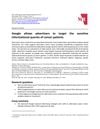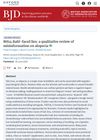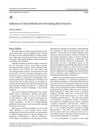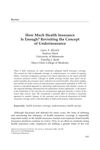 November 2024 in “Skin Appendage Disorders”
November 2024 in “Skin Appendage Disorders” Misinformation about alopecia can lead to poor treatment, so it's important for healthcare professionals to correct myths.
 21 citations,
May 2021 in “Patient education and counseling”
21 citations,
May 2021 in “Patient education and counseling” Managing PCOS is hard because it varies a lot, treatments are limited, and there's a lot of false information online.

Google should ban ads targeting cancer patients with sensitive health-related keywords to protect them from misleading information.
August 2024 in “International Journal of Nursing Studies Advances” Following hair transplant surgery, proper self-care is crucial for successful recovery and hair growth.
 June 2024 in “British Journal of Dermatology”
June 2024 in “British Journal of Dermatology” Misinformation about alopecia is common online and can harm patient choices.
 December 2023 in “Journal of Drugs in Dermatology”
December 2023 in “Journal of Drugs in Dermatology” Media coverage increased public interest in oral minoxidil for hair loss but may also spread misinformation.
 26 citations,
October 2021 in “Current Dermatology Reports”
26 citations,
October 2021 in “Current Dermatology Reports” Social media is increasingly used in dermatology for education and networking but has risks like misinformation and privacy issues.
 March 2024 in “Journal of skin and stem cell”
March 2024 in “Journal of skin and stem cell” Social media often spreads unreliable skincare advice, leading to potential skin problems, especially in teens.
 244 citations,
September 2008 in “Annual Review of Genomics and Human Genetics”
244 citations,
September 2008 in “Annual Review of Genomics and Human Genetics” The document concludes that the fast-growing direct-to-consumer genetic testing market lacks sufficient regulation, posing risks to consumers due to questionable test quality and accuracy.
 January 2018 in “Annals of Dermatology”
January 2018 in “Annals of Dermatology” Newspaper articles on alopecia are often inaccurate and sometimes mix up different types of hair loss.

Women with PCOS have lower self-esteem and body image satisfaction.
April 2022 in “DOAJ (DOAJ: Directory of Open Access Journals)” Effective hair regrowth after COVID-19 involves psychological support, good nutrition, and hair growth treatments.

Some TikTok hair loss remedies like rosemary oil, onion juice, and garlic gel show promise, but more research is needed and they might delay proper treatment.
24 citations,
June 2020 in “Journal of the American Academy of Dermatology” Patients reduced searches for dermatology issues during COVID-19, indicating a need for better telehealth services.
 39 citations,
January 2012 in “Indian Dermatology Online Journal”
39 citations,
January 2012 in “Indian Dermatology Online Journal” Finasteride may cause sexual side effects like erectile dysfunction, but they are reversible and affect less than 2% of men.
 68 citations,
January 2007 in “Journal of Cosmetic and Laser Therapy”
68 citations,
January 2007 in “Journal of Cosmetic and Laser Therapy” Laser/light treatments for hair loss are popular but lack scientific data proving effectiveness.
 2 citations,
November 2021 in “Regenerative Medicine”
2 citations,
November 2021 in “Regenerative Medicine” UK stem-cell clinics often mislead about treatment safety and effectiveness, needing better regulation.
 67 citations,
January 2013 in “Indian Journal of Dermatology, Venereology and Leprology”
67 citations,
January 2013 in “Indian Journal of Dermatology, Venereology and Leprology” Chronic Telogen Effluvium may resolve after years and is diagnosed by examining the patient's history and clinical signs, with treatment aimed at underlying causes and possibly minoxidil.
 65 citations,
March 2016 in “Lasers in Medical Science”
65 citations,
March 2016 in “Lasers in Medical Science” Most low-level light therapy studies did not accurately report how light was measured, affecting treatment reliability.
 24 citations,
March 2015 in “Dermatologic Surgery”
24 citations,
March 2015 in “Dermatologic Surgery” Home-use cosmetic laser and light devices show modest results for hair removal and acne treatment, but more research is needed for confirmation.
 12 citations,
January 2019 in “Regenerative Medicine”
12 citations,
January 2019 in “Regenerative Medicine” The document suggests a need for collaboration, better evidence, and a responsible framework to safely and effectively advance regenerative therapies to clinical use.
 8 citations,
October 2023 in “JMIR dermatology”
8 citations,
October 2023 in “JMIR dermatology” ChatGPT can be a helpful dermatology resource but should not replace professional consultations.
 6 citations,
April 2019 in “Endocrinology and Metabolism Clinics of North America”
6 citations,
April 2019 in “Endocrinology and Metabolism Clinics of North America” Testosterone therapy for transmasculine individuals is generally safe with medical supervision, improves mental health, and has mixed effects on physical health.
 36 citations,
November 2006 in “Medical Care Research and Review”
36 citations,
November 2006 in “Medical Care Research and Review” The document concludes that there is no clear definition of adequate health insurance, and a consistent method to measure underinsurance is needed.
 22 citations,
October 2017 in “Australian & New Zealand Journal of Obstetrics & Gynaecology”
22 citations,
October 2017 in “Australian & New Zealand Journal of Obstetrics & Gynaecology” Many young Australian women think they have PCOS, but only a few are diagnosed correctly, causing unnecessary worry.
 1 citations,
July 2019 in “British Journal of Dermatology”
1 citations,
July 2019 in “British Journal of Dermatology” Minoxidil was more effective than laser therapy for hair loss, and the report also highlighted the need for more research on PRP for a different hair loss condition, the impact of social media on alopecia views, and a warning on turmeric causing nail discoloration.
 December 2023 in “Health Information Jurnal Penelitian”
December 2023 in “Health Information Jurnal Penelitian” Post-COVID syndrome causes long-lasting symptoms like fatigue, breathing issues, and anxiety.
 3 citations,
August 2021 in “Clinical, Cosmetic and Investigational Dermatology”
3 citations,
August 2021 in “Clinical, Cosmetic and Investigational Dermatology” Teledermatology was popular among young adults and women, and high-resolution photos improved service during the pandemic.
 6 citations,
August 2023 in “European journal of endocrinology”
6 citations,
August 2023 in “European journal of endocrinology” The 2023 guideline advises a detailed approach for PCOS, focusing on early detection, lifestyle and medical treatments, and managing health risks.
 3 citations,
April 2022 in “Clinical, Cosmetic and Investigational Dermatology”
3 citations,
April 2022 in “Clinical, Cosmetic and Investigational Dermatology” Different methods, including stress management, healthy diet, supplements, and treatments like minoxidil, can help hair grow back after COVID-19 related hair loss.



























